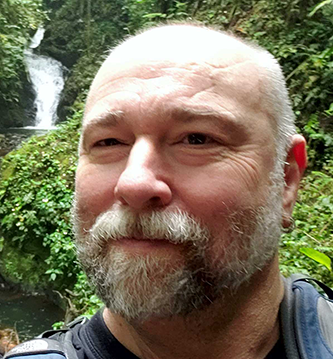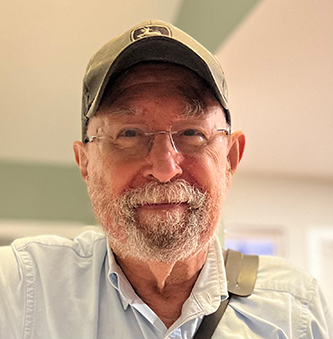Brooklyn College Professors Wayne Powell and H. Arthur Bankoff Help Reveal Details of Ancient and Complex Trade Network in Present Day Turkey
December 5, 2022

Earth and Environmental Sciences Professor Wayne Powell

Professor Emeritus of Anthropology H. Arthur Bankoff.
More than 3,000 years before the Titanic sunk in the North Atlantic Ocean, another famous ship went down in the Mediterranean Sea off the eastern shores of Uluburun—in present day Turkey—carrying tons of rare metal. Since its discovery in 1982, scientists have been studying the contents of the Uluburun shipwreck to gain a better understanding of the people and political organizations that dominated the time period known as the Late Bronze Age.
Wayne Powell, a professor of Earth and Environmental Sciences at Brooklyn College and H. Arthur Bankoff, a professor emeritus of Anthropology, were both involved in recent research featured in Science Advances that chronicles a surprising finding: small communities of nomadic highland pastoralists living in what is present day Uzbekistan in Central Asia produced and supplied roughly one-third of the tin found aboard the ship—tin that was enroute to markets around the Mediterranean to be made into coveted bronze metal.
Powell and Bankoff worked with a team of scientists, including Michael Frachetti professor of archaeology in Arts & Sciences at Washington University in St. Louis, and others on the discovery that highlighted the advances in geochemical analyses, which enabled researchers to determine with high level certainty that some of the tin originated from a prehistoric mine in Uzbekistan, more than 2,000 miles away from Haifa, where the ill-fated Mycenae-bound ship loaded its cargo.
But how could that be? During this period, Uzbekistan was occupied by small communities of nomadic highlander pastoralists—far from a major industrial center or empire. And the terrain between the two locations—which passes through Iran and Mesopotamia—was rugged, which would have made it extremely difficult to pass tons of heavy metal.
The team of archaeologists and historians were enlisted to help put the puzzle pieces together. Their findings unveiled a shockingly complex supply chain that involved multiple steps to get the tin from the small, seasonal mining communities to the Mediterranean marketplace.
The idea of using tin isotopes to determine where metal in archaeological artifacts originates dates to the mid-1990s, according to Powell, also a lead author on the study with Frachetti. However, the technologies and methods for analysis were not precise enough to provide clear answers. Only in the last few years have scientists begun using tin isotopes to directly correlate mining sites to assemblages of metal artifacts, he said.
“Over the past couple of decades, scientists have collected information about the isotopic composition of tin ore deposits around the world, their ranges and overlaps, and the natural mechanisms by which isotopic compositions were imparted to cassiterite when it formed,” Powell says. “We remain in the early stages of such study. I expect that in future years, this ore deposit database will become quite robust, like that of Pb isotopes today, and the method will be used routinely.”
Powell has done extensive research on the topic of the tin trade across Late Bronze Age Eastern Europe and the Balkans (Baltic to Adriatic to the Black seas) and has also worked on the Bronze Age tin mines in Turkey. He is currently examining the complexities of Viking and Roman trade as well. Bankoff has more than 35 years of archaeological laboratory and fieldwork experience and has directed excavations and field schools in New York, Yugoslavia, Bulgaria, Israel, and Cyprus.
Some 30 years later, the researchers finally have a more definitive answer thanks to the advanced tin isotope analyses techniques: One-third of the tin aboard the Uluburun shipwreck was sourced from the Mušiston mine in Uzbekistan. The remaining two-thirds of the tin derived from the Kestel mine in ancient Anatolia, present day Turkey.
“Recent isotopic work has opened our eyes to distant tin sources. It has long been a puzzle as to where the Aegean world procured the tin to make the bronze needed for arms and tools,” Bankoff says. “Now we can see the supply chain reaching all the way to Central Asia, linking disparate peoples and economies. This work is a stellar example of the benefits of multidisciplinary collaboration. It would not have been possible without the skills and expertise of the historians, the geochemists, the archaeologists, the epigraphers, and others on the team. Our far-ranging discussions produced truly exciting results.”
The findings also show that life 3,000-plus years ago was not that different than it is today.
“With the disruptions due to COVID-19 and the war in Ukraine, we have become aware of how we are reliant on complex supply chains to maintain our economy, military, and standard of living,” Powell said. “This is true in prehistory as well. Kingdoms rose and fell, climatic conditions shifted, and new peoples migrated across Eurasia, potentially disrupting or redistributing access to tin, which was essential for both weapons and agricultural tools. Using tin isotopes, we can look across each of these archaeologically evident disruptions in society and see whether connections were severed, maintained, or redefined. We already have DNA analysis to show relational connections. Pottery, funerary practices, etc., illustrate the transmission and connectivity of ideas. Now with tin isotopes, we can document the connectivity of long-distance trade networks and their sustainability.”






